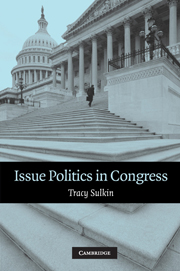Book contents
- Frontmatter
- Contents
- List of Figures
- List of Tables
- Acknowledgments
- Issue Politics in Congress
- 1 Electoral Challenges and Legislative Responsiveness
- 2 A Theory of Issue Uptake
- 3 The Nature of Campaign and Legislative Agendas
- 4 Assessing Uptake
- 5 Who Responds? Explaining Individual Variation in Uptake
- 6 Patterns of Responsiveness in Congress
- 7 The Electoral Impacts of Uptake
- 8 Uptake and Public Policy
- 9 Elections, Governance, and Representation
- Appendix: House and Senate Samples
- References
- Index
8 - Uptake and Public Policy
Published online by Cambridge University Press: 08 January 2010
- Frontmatter
- Contents
- List of Figures
- List of Tables
- Acknowledgments
- Issue Politics in Congress
- 1 Electoral Challenges and Legislative Responsiveness
- 2 A Theory of Issue Uptake
- 3 The Nature of Campaign and Legislative Agendas
- 4 Assessing Uptake
- 5 Who Responds? Explaining Individual Variation in Uptake
- 6 Patterns of Responsiveness in Congress
- 7 The Electoral Impacts of Uptake
- 8 Uptake and Public Policy
- 9 Elections, Governance, and Representation
- Appendix: House and Senate Samples
- References
- Index
Summary
The analyses to this point have demonstrated that congressional campaigns have a clear legacy in the content of legislators' agendas in office. Challengers' issue priorities in these campaigns are regularly taken up by winning representatives and senators in their bill, resolution, and amendment introductions and cosponsorships, and in their statements on the floor. While the degree of responsiveness varies across individuals and, to a lesser extent, across legislative activities and across time, uptake itself is a widespread phenomenon. Moreover, not only do legislators behave as if they believe that this behavior will pay off for them, there is evidence that it actually does. High-uptake legislators tend to face less competition in the next election and do better at the polls than their lower-uptake peers. These findings provide strong support for the two basic claims underlying the theory of uptake — that legislators' experiences as candidates shape their subsequent behavior in office, and that this responsiveness to campaigns is motivated, at least in part, by their desire to be reelected.
What have yet to be examined are the policy implications of these linkages between legislators and their campaigns — in particular, how much downstream impact legislators' uptake behavior has on the content of the laws passed by Congress. Given uptake's considerable influence on the congressional agenda, it is reasonable to assume that we will observe traces of this influence in later stages of the policy process.
- Type
- Chapter
- Information
- Issue Politics in Congress , pp. 150 - 166Publisher: Cambridge University PressPrint publication year: 2005



